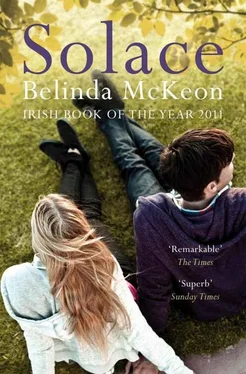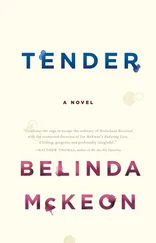‘Now,’ said his mother, putting a plate of chicken and chips on the table behind him.
‘Thanks,’ Mark said, and walked to the place she had laid for him across from his father.
It had been a beautiful summer’s evening. It had been hard to want to be anywhere else, looking out at the meadows stretching golden against the sunset, and at the small lake beyond them, and at the bruised blue and grey of the hills on the horizon. But then one of the chains on the baler snapped, which meant that Mark had not been watching the feed of grass closely enough. It would set them back an hour. From the tractor cab he could see his father’s face as he stood, watching, with the pitchfork in hand.
There had been an argument. Mark was accused of laziness and sloppiness and, finally, of ignorance — in his father’s book, a truly unforgivable trait, though also, Mark suspected, a word whose meaning his father did not precisely understand. Tom was asked, again and again, to get out of the way; out of the fucking way, actually, which did nothing to calm his temper. Mark was asked to stop cursing, Tom to stop roaring — that had been the contribution of Maura, who had come out to help rake the hay into rows. Maura had been asked to stay out of it. The chain had been repaired, the clumps of hay raked into another row, and the evening had looked just as beautiful, still, but filtered through a gauze of unease. Inside those houses on those hills were people, and people made everything difficult; tripped over one another and tripped one another up. So, it didn’t matter how beautiful the place was, or the evening. It was just a rare few hours of sun in a place where, usually, the bogland would suck you in up to your sorry knees. That was all.
Over dinner, his mother asked questions about the ground and the hay and the forecast for the next day, his father gave short answers, and Mark devoted his thoughts to a steady stream of images of Joanne Lynch without any clothes on; to what she might whisper, what she might urge. He caught his father looking at him as though knowing exactly what was running through his mind.
‘I’m going to start on those last two fields as soon as the sun is up tomorrow morning,’ he said, and his father shook his head.
‘There’s not that much rush on them,’ he said, filling his glass with milk. ‘A normal hour of the morning will be time enough. Anyway, you want to wait for the sun to take hold.’
‘I want to get through them,’ Mark said.
‘So you’re in a hurry,’ his father said sullenly, and beside him at the table his mother sighed.
He was upstairs trying to read shortly afterwards when a knock came on the bedroom door. He closed the book. Belinda . It was not difficult to close. It was the one Edgeworth book he had never been able to get into.
‘Come in,’ he said, though his father was already in.
‘You’re working,’ his father said, nodding to the book.
‘Not that hard,’ Mark said, and cleared his throat just as his father did exactly the same thing. Mark began to crack a smile at this synchronicity, but stopped himself: it was pointless; his father would not have noticed the coincidence, he would wonder why Mark was smiling. It was best to wait for his father to say what Mark knew he was going to say.
‘Would you be interested in going down to Keogh’s for a while?’ Tom looked directly at Mark for just an instant, then to the book where it lay on the bedspread. ‘If you’re not too busy with your studies.’ He did not wait for Mark to reply. ‘You’re hardly working this late, anyway, are you? That’s bad for your eyesight.’
‘No, that’s something else,’ Mark couldn’t stop himself saying. His father gave a short laugh, but looked uncertain.
‘I’ll be going in a few minutes,’ he said, and closed the door.
Mark picked up his phone. Down home , he typed. Thanks for this morning . He deleted that. Thanks for the weekend , he typed instead. Give you a call later in the week? He signed off with his initial, though it was hardly necessary: she had his number, she would know it was him. Just thought about you long and hard , he typed in then, just for the sake of seeing it on the small grey screen; he deleted it, and sent the rest of the message. Immediately, he panicked that he hadn’t deleted the last line; it was stupid to worry about it, but it would have been just his luck.
There were only the regulars in Keogh’s. Tom and Mark took the usual spot at the bar, beside Charlie McCabe the postman — or the retired postman, as he was now. Charlie shook hands with them both and asked Mark what he was up to in the city, these days.
‘This and that.’ It was the same answer Mark had given Charlie the last time he had met him in Keogh’s, and probably, he thought, the time before that as well. It was all that was required. If he had launched into a description of what he was really doing, or of what he was supposed to be doing — his thesis, his supervisor, the manuscripts, the letters — Charlie would look uncomfortable very quickly, and his father’s evening would be ruined.
‘You’ve a good loch of those meadows taken care of, by the looks of it.’ Charlie turned to Tom instead.
Paddy Keogh himself was behind the bar, and as he placed three fresh pints in front of them he came easily into the conversation; he had saved his own meadows the previous week, he said, as soon as the first sign of the good weather had arrived.
‘ Ara , I should have waited like yourselves, lads,’ he said, ‘but I’m not near as brave or as patient as the two of yous.’
‘Bragging prick,’ Tom muttered, as soon as he was out of earshot, and Charlie laughed.
‘He hasn’t a whole lot to be bragging about when it comes down to it,’ Charlie said. ‘There was hardly a blade of those fields dry when he sent the sons in to get hay out of them. Sure, that rain there the week before last.’
Tom nodded. ‘Greedy.’
‘Greedy. They have the meadow destroyed, dragging bales out of it before the ground was hard enough.’
‘Aye.’
‘Better to do it like you done it, Mark, not a bit of hurry on you at all.’
In reply, Mark gave Charlie the vaguest of nods. It was an established rhythm. There were set subjects, set questions, set responses; a set way to move your head, to shrug your shoulders, to turn slowly towards the door and keep an eye on whoever was coming in. When you laughed, when you really laughed, you turned your whole body in on itself, hooped over, like you were trying to keep the laugh where it was, trying to keep a hold on it. Even after several pints, these rules stayed in place; those who did not observe them were outsiders, or troublemakers, or drunks. Those were the people who were likely to shout, or to sing, or to send a pint glass clattering to the ground; to make a show of themselves. There would always be someone to see them to the door and, more often than not — what else were you going to do with them? — to their cars.
Mark had been coming here with his father since he was five or six years old. Younger, even. You didn’t bring a child into the pub at night, but on Saturday and Sunday afternoons his father would drop in for a pint, and would bring Mark with him, buy him a mineral and a bag of crisps. There was a video game underneath a screen set into a low table, and when Mark was a teenager, Keogh had put in a pool table, so that it became the place to spend as many nights as you were let, swaggering in front of local girls. Girls he wouldn’t even look at now.
She would never have been one of them. The Lynches never came in here; her parents went only to the hotel in Edgeworthstown, and the sons went drinking there too, in one of the bigger pubs. Joanne would have gone to Longford, to Fallon’s, maybe, or Valentine’s, or Eamon’s, if she had gone through that grunge phase, which everyone around the place had. She would have looked much the same at sixteen or seventeen as she did now; in a way, she still looked that age. It was hard to believe she would be a solicitor in two years.
Читать дальше












